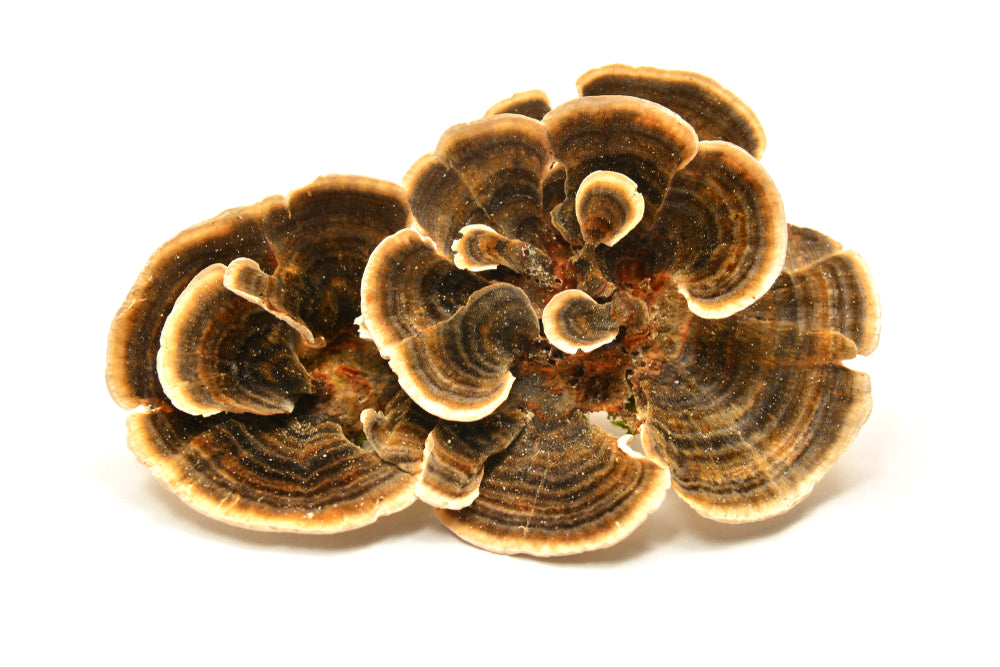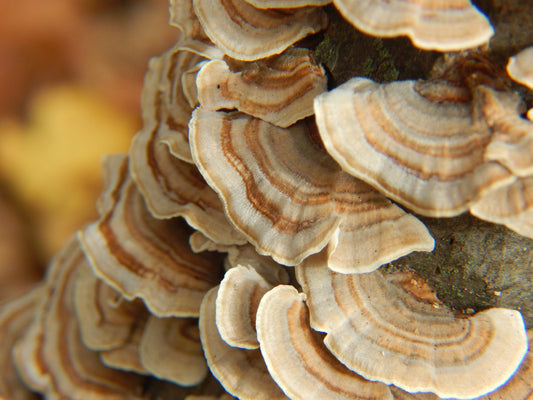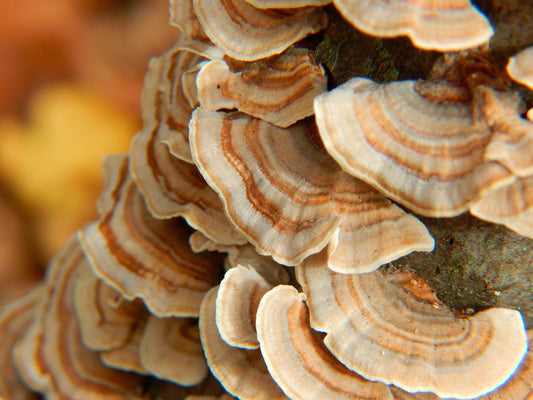As one of the most researched and sought-after mushrooms for its immunomodulatory properties, turkey tail, also known as trametes versicolor, is a medicinal mushroom that can be found across the world. With its colorful, feather-like resemblance to a turkey, you might think this incredible fungus is easy to spot in the wild, but that’s not quite the case. On the contrary, there are many turkey tail look-alikes that can fool mushroom newbies and maestros alike. One of them is stereum ostrea—or false turkey tail.
This article will discuss a brief history of turkey tail mushrooms, their impressive benefits, the differences between turkey tail vs. false turkey tail, and why you don’t have to worry about making the wrong choice with Om Mushroom Superfood® by your side.
Turkey Tail Mushrooms: A Quick Overview
Turkey tail is recognized as a healing mushroom for its longevity and health-related effects.‡ Its use dates back centuries when Traditional Chinese Medicine practitioners brewed turkey tail mushrooms into soothing teas.
Today, turkey tail is used as a popular wellness supplement. And while many of these products are created from mushrooms grown safely indoors, some mushrooms can be harvested directly from the wild, including—you guessed it—turkey tail.
Turkey tail grows in many places, including North America, Europe, and Asia. Its rounded exterior and many colors make it easy to spot on a fallen tree or log. But turkey tail is not the only mushroom of its kind. In fact, you may even find other species growing in the same location, making differentiating it from others a challenge.
Turkey Tail Benefits
Before comparing turkey tail vs. false turkey tail, it's important to explore the benefits of the former. Turkey tail’s many immune-supportive properties are due to the polysaccharides that occur naturally within its cell walls.‡ These natural polysaccharides are known as immune response modulators that interact with our innate and adaptive immune systems and provide support for a balanced immune function.
Additionally, the antioxidants, beta glucans, and bioactive compounds contribute to the immune-supporting properties of this powerhouse mushroom. And since as much as 80% of our immune system is housed in our gut, consuming turkey tail consistently can also support gut health.‡

The other supportive benefits of turkey tail include:
- Weight management‡
- Blood sugar level support‡
- Support of liver function and normal detoxification processes
The many advantages turkey tail offers make this mushroom a popular choice for mycophiles—or those who enjoy harvesting wild mushrooms.
Turkey Tail vs. False Turkey Tail
As mentioned before, turkey tail has many lookalikes, with false turkey tail being the most notable one. Much like turkey tail, false turkey tail is a saprophytic mushroom, which is a type of mushroom that grows on decaying or dead hardwood trees. Turkey tail and false turkey tail are from the Stereaceae mushroom family, each having a distinctive rounded, fan-shaped appearance. The fruiting body is often a flat shelf with a short or absent stem. While the physical characteristics of these polypore mushrooms are similar, it’s actually quite simple to distinguish between turkey tail vs. false turkey tail.
Here are the key characteristics to look out for.
|
Turkey Tail (Trametes versicolor) |
False Turkey Tail (Stereum ostrea) |
|
|
Color |
Distinct colors with shades of brown, gray, orange, and green ascending from the cap. Has a white detail on the outer rim, resembling that of a turkey’s tail. |
Has a vibrant red or brown coloration, but may also have a subtle orange hue. |
|
Shape |
Rounded with a flat shape. Thin and flexible if fresh and less flexible when dried. Turkey tail will be 2-4 cm across and 1-3 cm in length. |
Rounded with a slightly upward curvature. Reaches widths of 5-7 cm, making this mushroom significantly larger than true turkey tail. |
|
Detail |
When turned over, true turkey tail will have small visible pores (potentially so small they may require you to squint to see them). Fresh turkey tail will have white pores, and dried will have yellow. Turkey tail may also have fine hairs. |
The undersurface of false turkey tail is smooth and will lack pores. The appearance looks aged and brown, similar to parchment paper. |
The easiest way to identify false turkey tail is by flipping the mushroom over to view the underside. Violet-toothed polypore has a fur-like bottom, also known as “teeth” on mushrooms, while gilled polypore has a maze-like underside. Both mushrooms are easy to eliminate during harvesting based on these visual characteristics.
Wait, Is False Turkey Tail Poisonous?
If you've found a false turkey tail mushroom by mistake, there’s no need to panic: None of the turkey tail lookalikes are poisonous. The tough texture of the false turkey tail makes it unsuitable for human consumption. However, while false turkey tail may not offer the same extraordinary benefits of the true turkey tail mushroom, one study did report that extracts from false turkey tail did have some antifungal and antibacterial properties.
Turkey Tail Organic Mushroom Powder Supplements: A Modern and Safe Approach
Harvesting mushrooms in the wild can be risky. Different variables such as weather conditions, environmental factors, and contamination can affect the quality of any species growing in the wild, making originally “non-toxic” mushrooms unsafe to consume.
At Om Mushroom Superfood®, our certified organic mushrooms are grown in a controlled, clean cGMP facility where they are monitored by mycology experts. Every single one is safely grown and free of environmental toxins, bugs, and pesticides. Our commitment to quality and food safety is reflected in our mushroom growth process.
Our Turkey Tail Organic Mushroom Powder blend and Turkey Tail Mushroom Capsules are safe, simple, and convenient ways to receive your daily intake of immune-supporting benefits. Just as important, you don’t have to deal with the risks and hassles of finding wild mushrooms yourself.
You can also add our turkey tail powder blend to coffee, smoothies, tea, and your favorite recipes. Or simply take three capsules every day with water to support optimal immune health.
[CTA]
‡These statements have not been evaluated by the Food and Drug Administration. Functional mushroom products are not intended to diagnose, treat, cure or prevent any disease.












